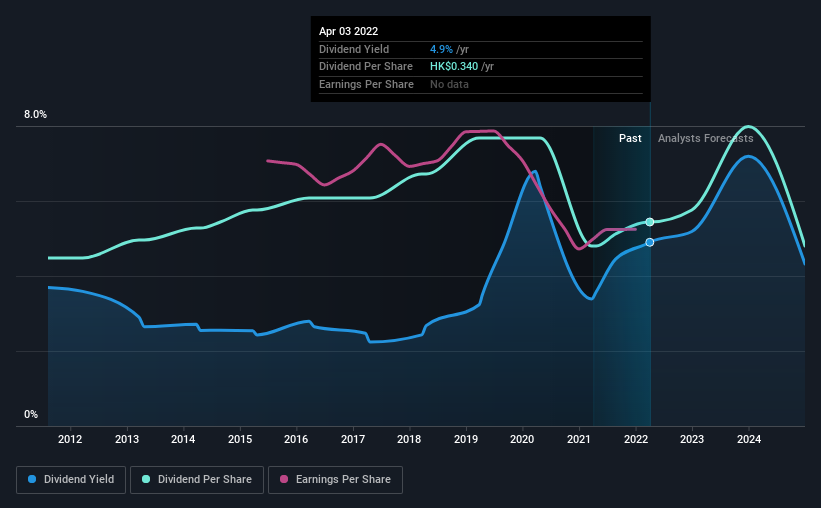Dah Sing Banking Group's (HKG:2356) Dividend Will Be Increased To HK$0.24
Dah Sing Banking Group Limited (HKG:2356) has announced that it will be increasing its dividend on the 16th of June to HK$0.24. Even though the dividend went up, the yield is still quite low at only 4.9%.
Check out our latest analysis for Dah Sing Banking Group
Dah Sing Banking Group's Dividend Is Well Covered By Earnings
The dividend yield is a little bit low, but sustainability of the payments is also an important part of evaluating an income stock. Before making this announcement, Dah Sing Banking Group was easily earning enough to cover the dividend. This means that most of its earnings are being retained to grow the business.
Over the next year, EPS is forecast to expand by 18.4%. Assuming the dividend continues along recent trends, we think the payout ratio could be 24% by next year, which is in a pretty sustainable range.

Dividend Volatility
While the company has been paying a dividend for a long time, it has cut the dividend at least once in the last 10 years. The dividend has gone from HK$0.28 in 2012 to the most recent annual payment of HK$0.34. This works out to be a compound annual growth rate (CAGR) of approximately 2.0% a year over that time. We're glad to see the dividend has risen, but with a limited rate of growth and fluctuations in the payments the total shareholder return may be limited.
Dividend Growth Is Doubtful
Growing earnings per share could be a mitigating factor when considering the past fluctuations in the dividend. Dah Sing Banking Group has seen earnings per share falling at 5.1% per year over the last five years. If the company is making less over time, it naturally follows that it will also have to pay out less in dividends. It's not all bad news though, as the earnings are predicted to rise over the next 12 months - we would just be a bit cautious until this can turn into a longer term trend.
In Summary
Overall, this is probably not a great income stock, even though the dividend is being raised at the moment. The payments haven't been particularly stable and we don't see huge growth potential, but with the dividend well covered by cash flows it could prove to be reliable over the short term. We would be a touch cautious of relying on this stock primarily for the dividend income.
Companies possessing a stable dividend policy will likely enjoy greater investor interest than those suffering from a more inconsistent approach. Meanwhile, despite the importance of dividend payments, they are not the only factors our readers should know when assessing a company. For instance, we've picked out 1 warning sign for Dah Sing Banking Group that investors should take into consideration. If you are a dividend investor, you might also want to look at our curated list of high yield dividend stocks.
New: Manage All Your Stock Portfolios in One Place
We've created the ultimate portfolio companion for stock investors, and it's free.
• Connect an unlimited number of Portfolios and see your total in one currency
• Be alerted to new Warning Signs or Risks via email or mobile
• Track the Fair Value of your stocks
Have feedback on this article? Concerned about the content? Get in touch with us directly. Alternatively, email editorial-team (at) simplywallst.com.
This article by Simply Wall St is general in nature. We provide commentary based on historical data and analyst forecasts only using an unbiased methodology and our articles are not intended to be financial advice. It does not constitute a recommendation to buy or sell any stock, and does not take account of your objectives, or your financial situation. We aim to bring you long-term focused analysis driven by fundamental data. Note that our analysis may not factor in the latest price-sensitive company announcements or qualitative material. Simply Wall St has no position in any stocks mentioned.
About SEHK:2356
Dah Sing Banking Group
An investment holding company, provides banking, financial, and other related services in Hong Kong, Macau, and the People’s Republic of China.
Adequate balance sheet average dividend payer.
Market Insights
Community Narratives




